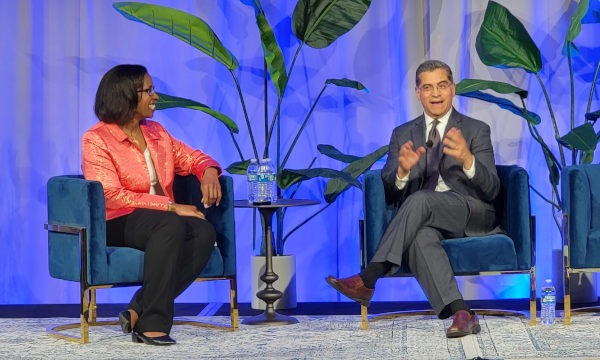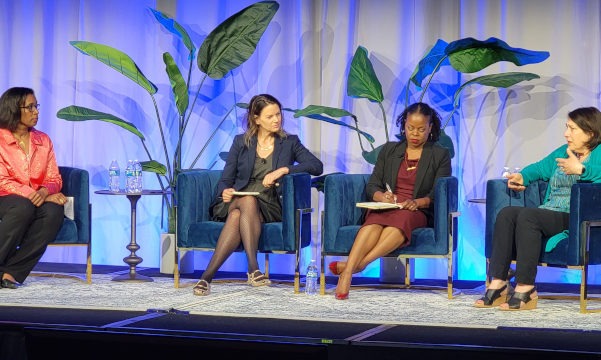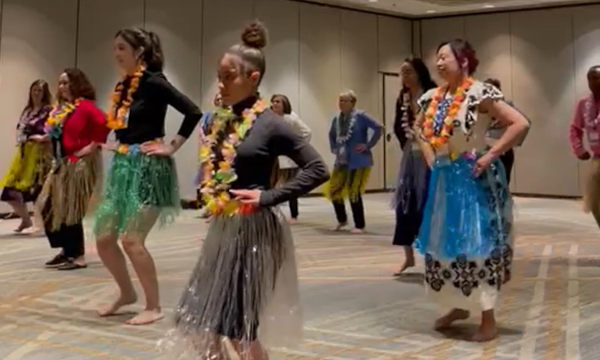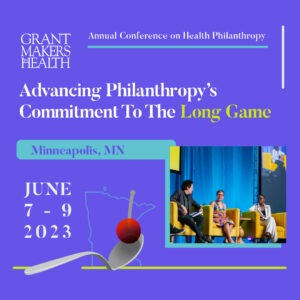Reporting from the 2023 Annual Conference on Health Philanthropy
“Wake up, we have work to do!”
Gregory Jackson, Executive Director with Community Justice Action Fund and 2023 winner of the Andy Hyman Award for Advocacy, recalled a common refrain from his parents.
Thursday at the GIH Annual Conference was a day filled with connection, learning, and growth. Wellness sessions featuring yoga, breathwork, and Hula as exercise gave attendees time to recharge in between an engaging lineup of sessions. Read more about today’s award luncheon, keynote address by HHS Secretary Xavier Becerra, plenary panel focusing on the implications of the Dobbs decision, and the conference offsite reception.


Spotlight on Keynote with Secretary Xavier Becerra and Plenary Panel – One Year Later: The Far-Reaching Implications of the Dobbs Decision
The 2022 GIH Conference on Health Philanthropy occurred just three days after Dobbs v. Jackson Women’s Health Organization. One year later, we dedicated the afternoon to reflecting on the impact of this decision. Today’s keynote speaker, Xavier Becerra, Secretary of the U.S. Department of Health and Human Services, emphasized that even though we experienced an unprecedented retraction of constitutional rights, communities have demonstrated remarkable resilience. Philanthropy has been at the forefront of nimble and intentional funding to drive long-term impact in the wake of such a consequential decision.
Throughout his career, including four years as the Attorney General of California, Secretary Becerra has seen the harmful impacts of allowing a political agenda to drive health care decisions. The U.S. Department of Health and Human Services aims to steer a better conversation, and philanthropy must take the most concrete and urgent action in support. He called upon those in the room to partner with HHS, so together we can increase access to reproductive health services and advance health equity. He highlighted the words of his mother: “Mejor prevenir que remediar. It is better to prevent than to remediate.” Prevention is an intentional commitment to the long game.
Following the keynote, three panelists led a plenary discussion titled One Year Later: The Far-Reaching Implications of the Dobbs Decision. The speakers included Alina Salganicoff, Senior Vice President and Director of Women’s Health Policy at KFF, Sarah Varney, Senior Correspondent of Kaiser Health News, and Dr. Jamila Perritt, President and CEO of Physicians for Reproductive Health.
The conversation underscored the challenges that people have faced around reproductive care for decades in the United States—abortion rights have been restricted well before the Dobbs decision. But since the overturning of Roe v. Wade, these restrictions have only deepened and have had wide-ranging health implications, including impacts on mental health, miscarriage management, and cancer treatment. The panel agreed there is not a one-size-fits-all approach to the issues being faced state by state, or person by person, and the challenges posed by the Dobbs decision will likely continue to ripple across the country for decades. “Medicine can be a liberatory practice. It might be a reach to say that it is today. But it can be. I believe things can improve,” said Dr. Perritt.
While the road ahead is challenging, panelists agreed that commitment to the long game for health equity is essential for funders committed to mitigating the harmful effects of Dobbs and forging a path ahead.
Session supported by W.K. Kellogg Foundation.
Quick Take Spotlight: Leading by Listening: United States of Care’s Approach to Creating Change through Centering People
What if together we could build a health care system for the future, by listening to the people it was meant to serve? The Leading by Listening: Creating Change through Centering People quick take featured Jennifer DeYoung and James Tatum from United States of Care. The session provided an overview of their multiyear project to develop a health care policy agenda from the ground up by listening to the needs and priorities of people, especially those often marginalized by the health care system today. The team at United States of Care used multiple listening methods including quantitative research, qualitative research, community conversations, and monitoring shifts over time. Through this research, the United States of Care team uncovered trends in a desire for care that is affordable, dependable, personalized, and easily navigable. This quick take left the audience with three things to remember as they move work forward in their organizations:
- To create the biggest impact, listen and design solutions around people first.
- Remember there is a person with real lived experiences behind every data point collected.
- Solve for inequalities that make it difficult to navigate the health care system in the first place.
Quick Take Spotlight: Building Momentum to Advance Health Equity: The Public Health and Equity Resource Navigator
One of the infrastructure failures exposed by the COVID-19 pandemic was the fragmentation of resources and information used by public health departments and others responding to the pandemic. This quick take highlighted PHERN, or the Public Health and Equity Resource Navigator, a centralized tool born out of the pandemic that aims to help changemakers navigate resources, advance equity, and build a resilient, robust, sustainable public health system for the future. PHERN features thousands of curated resources for the field of public health, with input from public health and allied audience sectors in mind. The session underscored ways PHERN is gaining momentum in their efforts—ranging from building sustainability across field resources to increasing ready-built capacity in public health. Explore or suggest content at https://phern.communitycommons.org/
Session designed by W.K. Kellogg Foundation and supported by Missouri Foundation for Health.
Breakout Spotlight: Building An Intersectional Funder Ecosystem to Achieve Equity in Birth Outcomes
What does birth equity mean to you? This interactive session started with a reflection on the working definition of birth equity and a deep dive into the origins of the Birth Equity Funders Summit, held in October 2022 in Atlanta, Georgia. Funders discussed practical recommendations to align the funder ecosystem and in turn foster peer learning, build greater transparency, and remove redundancies in approach. As a result of the conversation, some funders suggested a renewed or strengthened interest in cofunding and more general operating support to better serve grantees in their work and communities.
The session was designed by Afton Bloom, Funders for Birth Justice and Equity, and W.K. Kellogg Foundation. Supported by W.K. Kellogg Foundation.
Breakout Spotlight: Funding Solutions to the National Overdose Crisis
Overdose deaths in the United States have spiked to staggering rates in the last three years. In this session, The Foundation for Opioid Response Efforts (FORE) and RIZE Massachusetts Foundation shared their experiences activating an urgent mandate to support solutions to the opioid and overdose crisis. As the only public-private partnership dedicated to funding and collaborating on solutions to end the overdose crisis, RIZE Massachusetts Foundation takes a three-pronged approach to their work: investing in community, generating knowledge through funded research into the economic impact of the crisis, and convening in action from across the addiction-treatment ecosystem to break silos. FORE prioritizes working with partners advancing patient-centered, innovative, evidence-based solutions that can be tested, scaled, and replicated. Throughout the discussion, both foundations and the session attendees acknowledged the continued stigma around substance use disorder—even from people who have an addiction and funders who support harm reduction. Counteracting stigma is a long game and requires integrating new practices and people with lived experiences into the work. Furthermore, RIZE emphasizes the power of word choice with their “Words Matter Pledge,” and FORE leverages insights from Innovation Programs like No Stigma Nursing at UMass Dartmouth.
This session was designed by Foundation for Opioid Response Efforts.
Breakout Spotlight: Creating a Modern, Resilient, and Equitable Public Health System: Operationalizing Lessons Learned from COVID-19 to Advance Health and Well-Being
The COVID-19 pandemic exposed the fragility of the nation’s public health system, hampered by decades of understaffing and underinvestment. It also provided opportunities to build public health anew, in a system that centers communities to advance health equity. Creating a Modern, Resilient, and Equitable Public Health System: Operationalizing Lessons Learned from COVID-19 to Advance Health and Well-Being, highlighted resources compiled by the Alliance for Disease Prevention and Response and actionable ways philanthropy can continue to be a critical partner in these efforts. Check out the full resource list here.
This session was designed by the W.K. Kellogg Foundation.

On the Ground
“Hawaiian hula isn’t just a dance. It was a way for stories to get passed down to generations. But it’s also a great way to burn a few calories, while doing something enjoyable that helps to perpetuate the Hawaiian culture.”
– Cecilia Amor Kramer, Director of Development at GIH and “Hula as Exercise” wellness activity leader
Keynote Quote
“Mejor prevenir que remediar. It is better to prevent than to remediate.”
– HHS Secretary Xavier Becerra, reflecting on access to reproductive health care one year after the Dobbs decision
Fun fact: The first bridge to cross the Mississippi River was built in Minneapolis in 1854.

